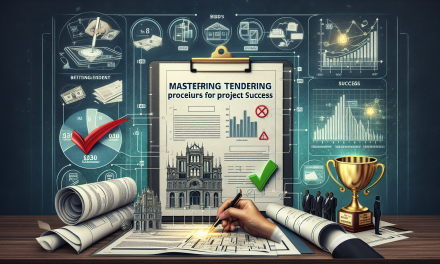Table of Contents
- Introduction
- Understanding Contract Administration
- The Contract Award Stage
- Managing Contracts Effectively
- The Contract Completion Process
- FAQs
- Conclusion
Introduction
When it comes to the world of business, understanding contract administration plays a crucial role in achieving success. Effectively managing contracts ensures that all parties meet their obligations and that projects remain on track. In this journey from the award of a contract to its successful completion, various strategies and insights come into play. This guide offers a friendly, detailed examination of these essential practices.
Understanding Contract Administration
Contract administration involves the management of contracts made with customers, vendors, partners, or employees. The goal is to optimize the contract’s performance and ensure that the contractual obligations are met in a timely and efficient manner. By delving into the intricacies of contract administration, professionals can directly contribute to their organization’s success.
The Importance of Contract Administration
Throughout this process, the primary focus remains on protecting the interests of all parties involved. Effective contract administration not only reduces risks but also facilitates a smoother execution process. Thus, understanding the various stages and elements of contract administration can make a significant difference.
The Contract Award Stage
The journey begins with the award stage, which sets the tone for the entire project. During this phase, several key activities need attention.
Preparation and Planning
Before formally awarding a contract, thorough preparation and planning are essential. Assess requirements clearly, which includes identifying stakeholders and defining project objectives. Having a comprehensive plan helps in ensuring that everyone is on the same page.
Choosing the Right Vendor
Selecting a capable vendor is among the most critical tasks in the award phase. Evaluate potential vendors based on their track record, financial stability, and experience relevant to the project. This meticulous selection process helps prevent future complications.
Negotiate Contract Terms
Next, engaging in meaningful negotiations concerning contract terms proves vital. Both parties should aim for mutually beneficial terms while remaining flexible. Transparent communication during this phase facilitates stronger relationships, paving the way for future collaboration.
Finalizing the Award
After negotiations, formalizing the contract is the final step in the award stage. This step involves drafting the contract, ensuring that it covers all pertinent information, and obtaining signatures from all parties involved.
Managing Contracts Effectively
Once the contract is awarded, the management phase begins. Effective management is crucial for keeping the project on track and ensuring that all parties fulfill their obligations.
Monitoring Performance
Ongoing monitoring of performance against the contract obligations remains fundamental. Regularly scheduled meetings or updates allow for adjustments when necessary. Furthermore, tracking project milestones helps ensure that timelines are met and identify any potential roadblocks.
Establishing Clear Communication Channels
Establishing clear communication channels between all stakeholders significantly enhances contract administration. Focus on maintaining open dialogue, which allows for the swift resolution of issues or misunderstandings.
Managing Changes and Amendments
Throughout the contract lifecycle, changes may be inevitable. By understanding the process for managing changes effectively, you can minimize impact and maintain project momentum. Implementing a structured change management process helps all parties navigate alterations smoothly.
Conflict Resolution
Even in the best-managed contracts, conflicts can arise. Addressing conflicts promptly and fairly is critical in maintaining professional relationships. Develop and implement a conflict resolution strategy that promotes collaboration and compromise.
The Contract Completion Process
The final stage of contract administration is the completion process. Transitioning smoothly to this phase ensures that the project concludes successfully.
Final Deliverables and Acceptance
As the project nears its completion, focus on gathering final deliverables. Ensure that all aspects of the contract have been satisfied before seeking formal acceptance from all parties involved. This step guarantees that the work meets the specified standards.
Conducting a Contract Review
Post-completion, conducting a contract review remains a valuable practice. This review assesses how well the contract was managed, what issues arose, and how effectively they were addressed. Gathering feedback from involved parties contributes to value learning.
Documenting and Archiving Essentials
Lastly, documenting the entire process is essential for future reference. Archive all relevant documents, including correspondence, amendments, and final deliverables. Proper documentation adds significant value to future negotiations and contracts.
FAQs
1. What is contract administration?
Contract administration involves managing contracts to ensure compliance with all terms and conditions, facilitating effective communication among stakeholders and promoting successful project outcomes.
2. Why is the award stage important?
The award stage sets the foundation for the project by establishing terms, selecting the right vendor, and formalizing agreements, ensuring all parties understand their roles and obligations.
3. How can I manage changes in a contract?
To manage changes effectively, establish a structured change management process that addresses how changes will be proposed, assessed, and documented, thus minimizing disruptions.
4. What should I include in a contract review?
A contract review should include an assessment of project performance, identification of areas for improvement, and feedback from all parties involved on contract management practices.
Conclusion
In conclusion, mastering the art of contract administration significantly impacts project success. From the award stage to the completion process, each phase requires careful management, effective communication, and proactive oversight. Embracing these principles will enable professionals to navigate the complexities of contract administration, resulting in successful collaborations and projects.
For those looking to enhance their skills even further, consider exploring the Master Contract Administration Course: From Award to Completion that provides invaluable insights and expertise. Additionally, delve into further learning through various resources such as Unlocking the Essentials: A Deep Dive into Contract Cost and Price Analysis, The Ultimate Guide to Mastering Contract and Claim Management, Mastering Advanced Contracts and Project Management for Success, Unlocking the Power of Effective Contract Management: Your Guide to Advanced Skills and Knowledge, and Understanding Contractual Risk: The Role of Insurance and Indemnity Certificates in Today’s Business Environment. Happy learning!





